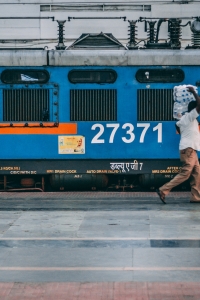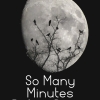
Deepak was face-to-face with a sweat-soaked armpit. The air in the compartment was so thick, it was difficult to move, and his freshly pressed white button-down shirt clung stickily to his back. The Mumbai local seemed crammed with people, yet when they stopped at Bandra station, like a reverse clown car, even more bodies squeezed in. Cursing under his breath, moving, thinking: these things just generated more heat, so he did not bother with them. A bead of sweat tickled the back of his neck as it rolled down. He longed to wipe it away, but his entire arm on that side, was jammed between someone’s thigh and his own. The smell that emanated from his fellow passenger’s perspiration, was pungent enough to make him dizzy, but he lacked the room to faint. Instead, he concentrated on breathing through his mouth, trying to ignore the fact that his lips were now pressed uncomfortably to body of this co-passenger, and he could taste yesterday’s garlic oozing from his skin.
He managed to distract himself momentarily, thinking about Mariam’s phone call. He had been waiting for something like this for years: a second chance to be who he was meant to be: an engineer, and not a clerk. And yet, the last few weeks was the first time there seemed like any sort of shift towards a reconciliation with Sonali.
A few people squatted along the floor, among them, a woman on her haunches, who pulled paper plates of steaming upma and idli out of the bag, like a railway Mary Poppins. Passengers thrust money at her and managed to shovel the food into their mouths no matter what convoluted position they had been forced into. He could not help but admire Mumbaikars: they were true survivors: braving the humidity, the apocalyptic hurricane-like rains, the crumbling infrastructure, the various riot-infused bandhs, and the traffic choking along narrow pockmarked roads, and somehow managing, most of the time, to make a living. Delhiites like himself would have long given up the fight.
The children who lived on the tracks ran around helter-skelter, largely naked, squatting down when they needed to use the toilet, not caring at all for the eyes that watched them from the moving trains. Watching their joy made him think of his own childhood, although more affluent, much more serious, and full of now broken dreams.
He had been obsessed with the locomotive.
His first exposure to trains was when Bhupesh Uncle, a distant relative, best known for inappropriately touching his nieces and nephews (though rarely more than an ‘accidental’ brush), brought him back a copy of The Little Engine That Could. This imaginary blue vehicle inspired young Deepak, so much so that he gritted his teeth through several instances of being forced onto Bhupesh Uncle’s lap to read it. “I think I can, I think I can,” he used to repeat to anyone who’d listen. Truth be told, back then he was more enamoured with all the stuff that he thought would come out of the trains such as toy trucks, boats, games, fat red apples, lollipops and the animals that the little engine helped get over the mountain. But in spite of these rather dubious reasons, no other hero ever appealed quite so much as she did.
Later, in school, he spent most days of his summer holidays dragging his parents to the rail museum and other various train-related events. Although all engines fascinated him, his favourite was the steam engine – because of the book, and also because it amazed him that you could produce enough energy to create movement with something so basic as water and fire. As a young adult, he also developed a fascination for high speed rail, and when the red line of the Delhi Metro opened in December 2002, he rode it from Tis Hazari to Shahdara even though he had no reason to be in either of those places or anywhere in between. He marvelled at the fact that this entire network of machinery, passengers and drivers was kept safe through this elaborate system of signal-based information. He had carried this love for engines to the top of his class at IIT, and everyone agreed he was headed for high places.
But then, right after he got married, his parents had perished in a fire leaving a string of bad debts and forcing him to work for their creditor, instead of pursuing his dreams. His wife, Sonali, and he had drifted so far apart that she had floated right into their neighbour’s bed. It was common knowledge in their society, and people often sniggered at him as if it was somehow his fault. It wasn’t until three weeks ago, when she, for the first time in several months, had pulled him close, that he had felt any stirrings of feeling for her.
But then he remembered Mariam, the softness of her compassion, the kindness of her gaze, and felt his heart squeeze. If only he had stood up for her, and not been pushed into a caste-based match with someone he had nothing in common with. He felt the guilt trickle down from heart to gut, as he thought of the last months, where he had allowed his thoughts to transgress all acceptable barriers. Especially now that everything between Sonali and him, seemed to be changing. Was he ready to give up on his marriage?
As the train pulled to a stop at Lower Parel, he jumped off before it stopped, cursing the sharp shooting pain that went up his knee. The offices of Satta & Sons were located in an ancient crumbling edifice, walking distance from the station. The approach was a rather hairy one, past the frying snack stalls, the vegetable stalls, the cartloads of produce, up a crumbling staircase onto the main road, and across the wide street he did not know the name of, and onto Tulsi Pipe Road. Mumbaikars may be survivors but their naming conventions are certainly bizarre, he mused.
Debris lined the corridors; the walls were painted a yellow that had blackened with age and pollution. The paint was chipping, and the whole place was damp and cold. He avoided the lift, since it was one of those old school lifts with those skeleton-looking metal doors that look like they could slice your fingers off. The stairs provided a bit of exercise, though painful after his platform jumps and slightly nauseating from the faint scent of urine.
He stepped inside the office, ducking his head as he came to the portion that was two storeys. They had built a mezzanine to save space, as it was people spent most of the day sitting at their desk, they would hardly need much standing room. This way, they could fit double the amount of people and skimp on rent. There was a single toilet, that reeked of a mix of diarrhoea, human sweat and lemon scented air freshener. A grimy glass of water with a plastic bottle was already sitting at his work station. He opened his laptop and started going through his emails.
He didn’t need to turn around to know that Mr. Prabhu was lingering behind him. The smell of onions wafted towards his nostrils.
“Good morning Sir,” he said.
“Good morning Deepak, have you set up that meeting with the distributor?”
Satta & Sons was a toy manufacturer that specialized in pushing out cheap replicas of Funskool favourites for a fraction of the price and double the choking hazards.
“Sir, I already told you, that company is not a toy distributor. They only deal in children’s books.”
Mr. Prabhu waved a sweaty palm at him, “Whatever, just get them on the phone. Never write off a customer.”
“Sure sir.”
Ten minutes later Mr. Prabhu was back at his desk. “You really must be more careful. That company isn’t even into toys.”
It was futile to say anything, because his boss had selective amnesia when it came to his own errors in judgement (which occurred several times a day). “Yes sir,” he muttered.
Mr. Prabhu walked away, pondering out loud: “these IIT types are really not all they’re cracked out to be.”
Deepak’s teeth were so far into his tongue, they were at the point of drawing blood. He had till the end of day to inform Mariam of his decision. He sighed.
At this point his thoughts were interrupted by something falling on the floor upstairs with a large thud. The false ceiling above him showered him with white powder, and he yelled up in protest. There was no answer.
He stood up, feeling fed up, grabbed his mobile, and strode towards the door. He jogged down the stairs and started walking towards the main road.
He found himself at the Theobromadown the street with a chocolate overload brownie. Whoever said money can’t buy happiness had obviously never experienced this miracle. 95 rupees was almost ten times the amount he paid to ride the local one way, but it was well worth his sanity and his blood sugar. Screw the savings, the time to live was now.
He took a slow bite feeling the warm chocolate spread across his taste buds and felt absolute ecstasy. It was rich, and the flavour veered just enough on bitter to make it truly decadent.
His phone beeped. It was Mariam.
“The tickets are ready. The train departs at 6pm.”
He remembered her words. “Leave it all behind. Deepak: it’s not worth it. You were brilliant in college, now you’ve shrunk, beat down by life, burdened by your circumstances, and suffocating in this prison. Life’s too short. You can figure out the flat and the debt and your wife’s feelings later. Live for today.”
They had been batchmates in college. Their relationship had been intense, each one driven and ambitious, each one equally serious about the other. But his parents would never have agreed to an inter-faith marriage. He was pleasantly surprised, when they reconnected after years apart, and she had suggested this role: a possible second chance for him in the field that he loved.
And yet Sonali seeing him as more than a loser finally, after all his sweat and tears, moved something within him. A month ago, he would have taken the new opportunity in a heartbeat, even though he was overwhelmed at the thought of working with Mariam. Now there was more at stake.
Pensive, he walked back towards his building. There was a crowd gathered outside the building.
He strained to hear the murmur. “Unit #507 has collapsed.”
“Some toy company”
“The false ceiling, what were they thinking making it into two floors. The quality of that construction.”
The voices trailed off, as he spotted Mr. Prabhu in the distance. He turned around and paused. The years of cruel words both from his employers and his wife echoed in his ears: the rejection, the used condom his neighbour left in their sheets (at least they were using protection?), Sonali's dismissal of any sort of attempt to make their relationship work. And of course there were the whispers circulating around his society: Sonali’s lover had spurned her, for his younger, prettier, yoga teacher.
He took a deep breath, walked back towards the road, and hailed a black and yellow taxi.
He cut his way through the hordes of people whose paths criss-crossed at Chhatrapati Shivaji Terminus, reservation number in hand, found his car and boarded. Sinking into the soft comfort of his seat, whilst nibbling on the samosa that he had just been served, he called Mariam.
“I’m so proud of you,” she said. “You’re making the right decision, welcome to the team.”
For the first time what seemed like a lifetime, he found himself able to dream again. He leaned his head on the window and watched the city, and with it, his troubles, fall away into the distance.
About the Author







Comments